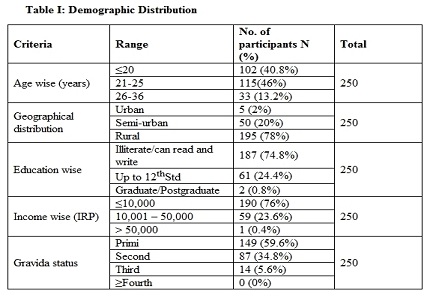Awareness and acceptance of labour analgesia in rural india
Abstract
Study has been carried out at Pravara Rural Hospital regarding awareness among expecting mothers about Labour Analgesia. Parturients attending ANC clinic were interviewed by anaesthesia residents according to questionaire prepared and responses were recorded. We wanted to study knowledge about labour analgesia in rural parts of India.
Method: After getting permission from ethical committee, 250 pregnant women attending ANC clinic were interviewed by anaesthesia residents according to prepared questionnaire and responses recorded. Parturients not willing to participate were excluded from study.
Results: Maximum (78%) respondents were from rural area. Their educational level was poor (39% were illiterate and 36% could only read and write). Majority of parturients belonged to low socio-economic group (76%). Awareness about painless delivery was minimal (98%), and after giving information about labour analgesia most (90%) were willing to experience painless delivery.
Discussion: As pain during delivery is most excruciating and can have impact on future of expecting mothers, nowadays methods to relieve pain of delivery are available. Still labour analgesia is not known to expecting mothers and not commonly used in rural India. Same is the condition in developing countries as shown by various studies.
Conclusion: Various methods need to be adopted to make expecting mothers aware about labour analgesia. Similarly, practicing obstetricians should encourage parturients for pain free delivery.
Downloads
References
Scherer R, Holzgreve W. Influence of epidural analgesia on foetal and neonatal well-being. Eur J ObstetGynecolReprodBiol 1995; 59(Suppl): 17–29.doi: https://doi.org/10.1016/0028-2243(95)93909-8.
Hug I, Chattopadhyay C, Mitra GR, KarMahapatra RM, Schneider MC. Maternal expectations and birth-related experiences: A survey of pregnant women of mixed parity from Calcutta, India.Int J ObstetAnesth. 2008; 17: 112–7.doi: https://doi.org/10.1016/j.ijoa.2007.10.004.
William WK. Quality Assurance Subcommittee in Obstetrics and Gynaecology, H.A., Hong Kong., A questionnaire survey on patients’ attitudes towards epidural analgesia in labour. Hong KongMed J. 2007; 13(3): 208-15.
Minhas MR, Kamal R, Afshan G, Raheel H. Knowledge, attitude and practice of parturients regarding Epidural Analgesia for labour in a university hospital in Karachi. J Pak Med Assoc. 2005;55(2): 63-6.
Mung’ayi V, Nekyon D, Karuga R. Knowledge, attitude and use of labour pain relief methods among women attending antenatal clinic in Nairobi. East Afr Med J. 2008; 85(9): 438-41.doi: https://doi.org/10.4314/eamj.v85i9.117084.
Okeke CI, Merah NA, Cole SU, Osibogun A. Knowledge and perception of obstetric analgesia among prospective parturients at the Lagos University Teaching Hospital. Niger Postgrad Med J. 2005; 12(4): 258-61.
Oladokun A, Eyelade O, Morhason-Bello I, Fadare O, Akinyemi J, Adedokun B. Awareness and desirability of labor epidural analgesia: a survey of Nigerian women. Int J ObstetAnesth. 2009; 18(1): 38-42.doi: https://doi.org/10.1016/j.ijoa.2008.07.011.
Pirbudak L, Balat O, Kutlar I, Uğur MG, Sarimehmetoğlu F, Oner U. Epidural analgesia in labor: Turkish obstetricians’ attitudes and knowledge. Agri. 2006; 18(2): 41-6.
Shidhaye RV, et al. Awareness and attitude of Indian pregnant women towards labour analgesia. Anaesth Pain and Intensive care. 2012: 16(2): 131-136.http://www.apicareonline.com/index.php/APIC/article/view/506/495.
Bharti Taneja, KirtiNath, Dua CK. Clinical audit on the existing attitudes and knowledge of obstetricians regarding labour analgesia. Indian J. Anaesth.2004; 48(3): 185-188. http://medind.nic.in/iad/t04/i3/iadt04i3p185.pdf.
Olayemi O, Aimakhu CO, Udoh ES. Attitudes of patients to obstetric analgesia at the University College Hospital, Ibadan, Nigeria. J ObstetGynaecol. 2003; 23(1): 38-40.doi: https://doi.org/10.1080/0144361021000043209.
Melzack R, Knor R, Dobkin P et al. Severity of labour pain, influence of physical as well as psychological variables. Can Med Assoc J 1984; 130: 579-84.
Melzack R. Labour is still painful after prepared childbirth training. Can Med Assoc J 1981; 125:357.
Mugambe JM, Nel M, Hiemstra LA, Steinberg WJ. Knowledge of and attitude towards pain relief during labour of women attending the antenatal clinic of Cecilia Makiwane Hospital, South Africa.SA Fam Pract 2007; 49(4):16. doi: https://doi.org/10.1080/20786204.2007.10873535.
Prof. Colin and R. Martin. Perinatal mental health. A clinical guide.



 OAI - Open Archives Initiative
OAI - Open Archives Initiative


